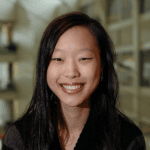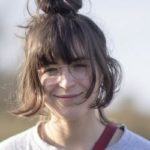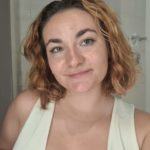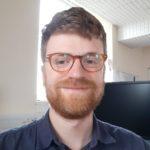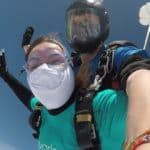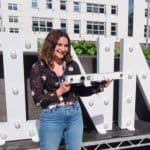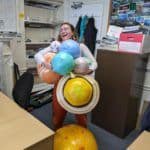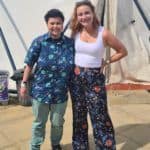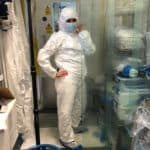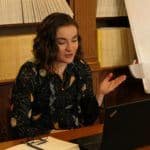Profile
Catherine Regan
CV
-
Education:
Nunnery Wood High School – 2009 to 2014
- Wasn’t in top set science – I felt like I wasn’t clever to pursue a career in science because of this, but worked really hard to get good science results
- I was a senior prefect, which involved me giving assemblies and tours on open evenings which helped my public speaking skills
- GCSE’s in triple science, geography, history and art
Worcester Sixth Form College – 2014 to 2016
- Studied AS level geology and A level maths, physics and geography
- Also did an EPQ (extended project qualification) which gave me an insight into what a research career would be like
University of East Anglia – 2016 to 2019
- BSc Environmental Geophysics
- President of Env Soc (Environmental Science) where I organised events and worked with the department
- Worked as a student ambassador where I spoke at open days and worked at local science festivals, improving my public speaking skills
University College London – 2019 to 2020
- MSc Planetary Science
University College London – Mullard Space Science Laboratory – 2020 to now
- PhD in Planetary Science
-
Qualifications:
GCSE’s: maths, English literature, English language, core science, additional science, biology, chemistry, physics, history, geography, philosophy and ethics, general art
AS Level: Geology
A Level: Maths, physics, geography
BSc Environmental Geophysics
MSc Planetary Science
-
Work History:
Museum and Shop Assistant – Museum of Royal Worcester – 2013 to 2017
- First job working at a local museum
- Worked as the front of house for the museum and shop, learnt customer service and public speaking skills
Support Assistant – National Grid – Climate Change & Sustainability Team – 2015
- Work experience with the National Grid
- Originally thought I wanted to work in climate science – realised this wasn’t the career for me but had a fantastic summer working with the team
Student Ambassador – University of East Anglia – 2017 to 2020
- Worked alongside my undergraduate degree, and even worked for the university after I graduated
- I gave tours on open days, and gave lectures about student life to prospective students
Research Assistant – Mullard Space Science Laboratory – UCL – Summer 2018 and 2019
- Work experience in the summer between university years
- Started once I realised I wanted to move into space science – rang up and sent my CV over and they offered me a placement!
- Contacts I made here became invaluable when applying for my masters and PhD
-
Current Job:
PhD Student at the Mullard Space Science Laboratory, University College London
-
Employer:
Science and Technology Facilities Council at the UK Research Institute
-
About Me:
I’m a planetary scientist studying Mars using data from multiple space missions! I also enjoy arts and crafts in my free time, as well as fundraising for Ovarian Cancer Action 🙂
-
Read more
I am a PhD student in Planetary Sciences studying the upper atmosphere of Mars using the Mars Express satellite. My first degree at university was in Environmental Geophysics, where I focussed on Earth’s volcanoes and earthquakes. When I was younger I didn’t think I was “clever enough” to do physics or astrophysics, so I started my career in the Earth sciences. After a conversation with a fantastic lecturer, she made me realise I could apply my knowledge in Earth geophysics to other planets, and that kickstarted my career into planetary science! I now work in public engagement and science communication to help people realise there is no academic limit to studying space and there no such thing as being “not clever enough”!
-
My pronouns are:
She/her
-
My Work:
I study the planetary induced magnetosphere of Mars and the effect of global dust storms using data from the Mars Express satellite.
-
Read more
Mars experiences a dust season every year, and occasionally dust storms merge to one storm system that covers the entire planet. These events increase the surface temperature and cause more of the atmosphere to be lost into space. I study how these events influence the high levels of the Martian atmosphere, called the ionosphere and magnetosphere. In the space surrounding Mars, boundaries are formed as the solar wind flows around the planet causing changes in behaviour in protons, ions and electrons. I study how these boundaries change during the dust events.
-
My Typical Day:
My day normally involves lots of coding and data interpretation from various space missions. If I’m not working on my research project, I am discussing space and/or science problems with other students in my office or preparing presentations or talks for me to give to the public.
-
Read more
Normally I wake up early and try to go to the gym before I arrive at work at 8ish. I start the day with admin jobs, sending emails, organising meetings and writing a to-do list for the day. I then begin with the tasks I’m working on. This could be coding and doing data interpretation from the Mars Express satellite, or writing up some of the results of my research findings. I then have lunch with other PhD students where we discuss everything from science to news to random ‘would you rather’ questions! I then go back to my office where I work on some of my outreach projects. This could be preparing talks I give to the public, or scheduling posts on social media from different outreach channels. I may then meet with my supervisor to update them on my research work, before leaving work at 5pm. I then spend the evening either with friends, or spending time with family.
-
What I'd do with the prize money:
I would put the money towards providing visits to my department – the Mullard Space Science Laboratory. We are the department of space and climate physics for University College London, but are based in the countryside in the Surrey Hills near Holmbury St Mary. The department conducts world leading research on everything within solar system science and astrophysics, as well as designing, building and operating scientific instruments that get sent into space (most recently the plasma instrument onboard ESA’s Solar Orbiter). As our location is so remote, not many people know we exist and it is difficult to get visitors as we aren’t near any public transport routes. I would use the prize money to put on open days and/or open evenings for schools and the public, so we can highlight the amazing science and engineering going on in the department.
-
My Interview
-
What did you want to be after you left school?
Teacher
Were you ever in trouble at school?
Sometimes for talking too much!
If you weren't doing this job, what would you choose instead?
Teacher
Who is your favourite singer or band?
Lady Gaga
What's your favourite food?
Macaroni Cheese
If you had 3 wishes for yourself what would they be? - be honest!
I wish I was better at coding, was better at getting up in the mornings and could change the colour of my hair without damaging it with hair dye!
Tell us a joke.
Would now be a good time to make a joke about a Mars rover dying? Or has the Opportunity passed?
-

